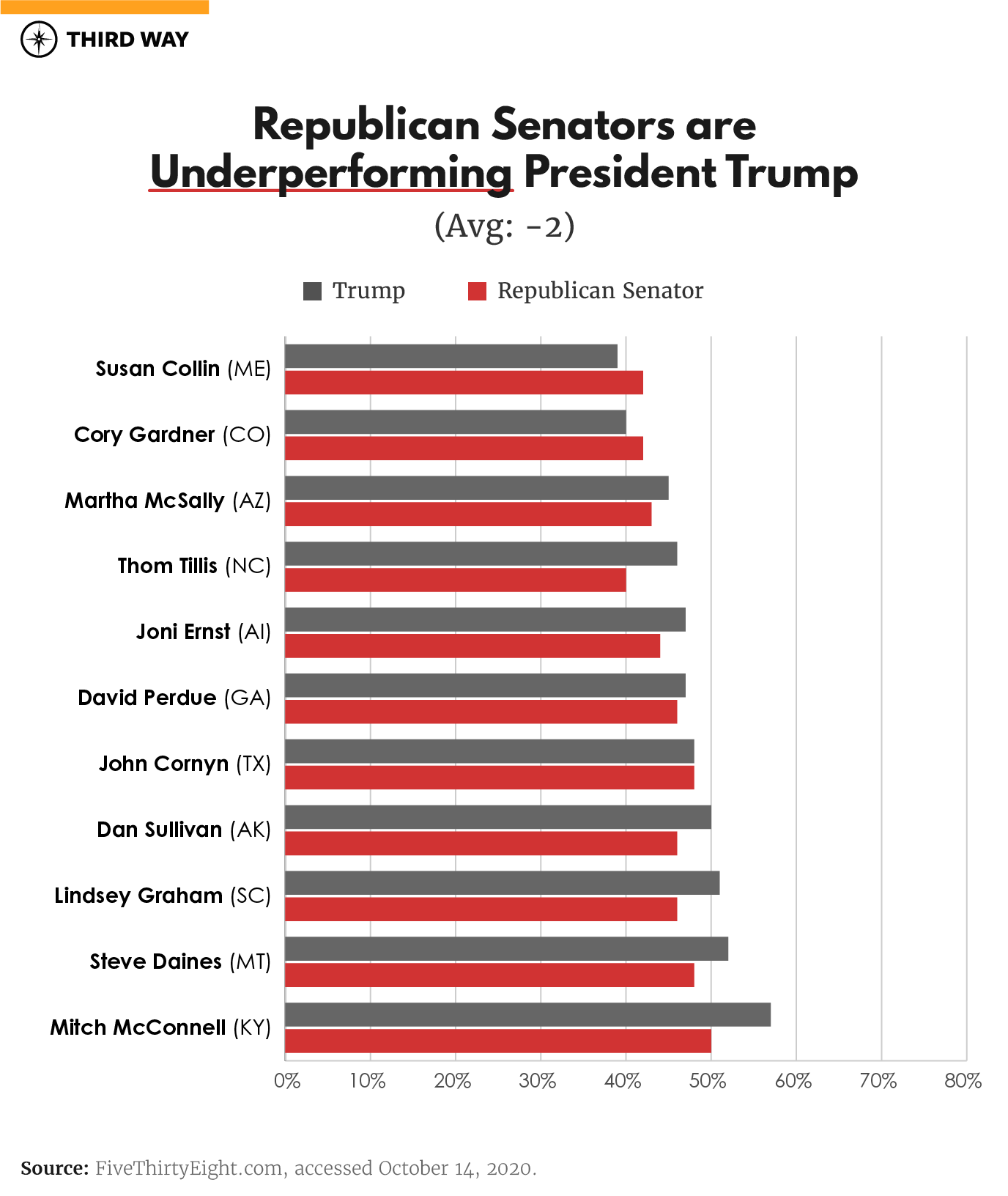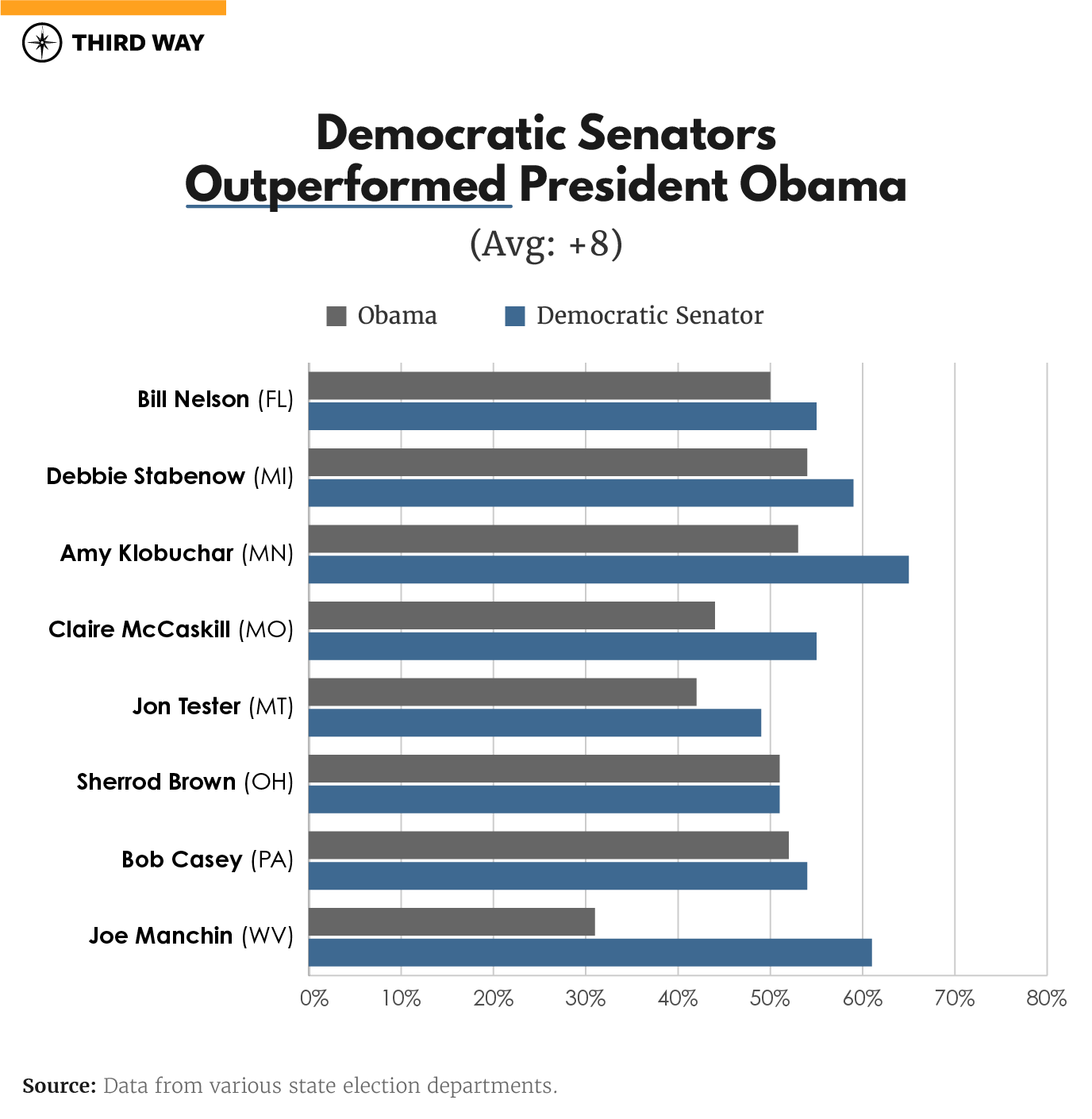Republican Senators Can’t Outrun Trump

Election night 2012 was a great night to be a Democrat, but the best kind of Democrat to be on that night was a Democratic Senatorial Campaign Committee staffer.
Democrats had a slim 53-47 majority heading into the election, but they had to defend seats in five states that President Obama was certain to lose and another seven in swing states. Still, it became apparent early on in the night that Democrats would easily keep the Senate and expand on their majorities. The victory was so resounding, it became clear Democrats would hold the Senate before Obama was declared the winner. And Senators like Joe Manchin (WV), Jon Tester (MT), Debbie Stabenow (MI), and Bob Casey (PA) ultimately outpolled the popular and nationally victorious Obama in their states.
In 2020, Republicans face a different challenge. If they hope to keep their own 53-47 Senate majority, they must overcome an unpopular, likely loser at the top of their ticket. The worry some Republicans have voiced is that Trump will drag down Senators with him, even in states that would typically be easy holds for their party. But it turns out that although Trump is a historically unpopular and divisive president, he is still more popular than congressional Republicans, and he is doing better in head-to-head polls than the named Senate candidates in key states. In fact, nearly every Senate Republican’s personal brand is worse than Trump’s brand in the states that will decide the majority.
The upshot for Mitch McConnell is this: without the equivalent of a Tester or Manchin who is able to outpoll their president and their party, it will be nearly impossible for any Republican Senator to survive if Trump goes down in their state.
An Opportunity Squandered
Before we jump into the details of specific races and candidates, we should ask the question: do voters split their ticket anymore? Could incumbent Senators ever outrun an unpopular Presidential candidate to save their own seats?
Using data from the progressive firm Catalist, we dug into the voter files to see whether ticket-splitting is still a real thing that could save popular Republican Senators. And it is in theory. In the 11 key races featuring a sitting Senate Republican, there a significant number of potential ticket-splitters. An average of about 17% of their likely 2020 voters have a score of at least 80% in the Catalist model which measures which voters are the most likely to be ticket splitters. The ticket splitter model does not specify where the split happens, so it's not necessarily between the presidential and Senate candidates.
In Arizona, 19% of their voters are potential ticket-splitters, in Iowa it’s 29%, and North Carolina is 23%. And the election results bear that out: voters in these states have picked candidates from both parties for statewide office in the last two cycles.
So if Biden wins those states, these ticket splitters could have spelled relief for the Senate GOPers. But the problem for these incumbents is that swing voters in their states do not like them. In fact, available data suggest there will be more Trump/Bullock voters in Montana or Trump/Kelly voters in Arizona than Biden/Daines or Biden/McSally in those states.
The Senate Squanderers
The problem for the current class of Senate Republicans isn’t Trump—it’s themselves. Perhaps these incumbents are experiencing the results of being more concerned with getting a Twitter head-pat from Trump or a few minutes on Hannity than they were with tending to their constituents back home. But with voters in their home states, they don’t get the fierce, cult-like devotion that Trump inspires nor the normal loyalty of incumbents who take care of business.
Looking at the 11 hottest Senate races featuring a Republican incumbent, they are underperforming Trump in their states by an average of two points. Some notable standouts are Thom Tillis (NC), Dan Sullivan (AK), Steve Daines (MT), Lindsey Graham (SC), and Mitch McConnell (KY), who underperform the President by at least four points in their respective states.
The one notable exception to the rule that GOP incumbents are less popular than Trump back at home is Susan Collins, who appears to have more support than Donald Trump in Maine. However, even Collins’ once massive independent and crossover Democratic appeal has mostly vanished. This incumbent who received about 250,000 more votes (20 percentage points in Maine) than John McCain in 2008 is probably on track to only overperform Trump by a middling single digit percentage in 2020.

This is a fundamentally different situation than the one Democrats faced when they were attempting to protect their majority in 2012. In the eight hottest 2012 Senate races involving a Democratic incumbent, those Senators outperformed President Obama by an average of eight points, an 11-point difference than the spread above. And not a single Democratic Senator in this group underperformed Obama, despite that President’s relative national popularity and winning campaign.

Furthermore, even if you want to attribute Trump’s overperformance over the Republican Senators to a top-of-the-ticket bounce in pre-election polling, what is remarkable is that Senate Democratic challengers are hugging Biden’s numbers the same as actual Republican Senators. That means the small increase in undecideds in Senate polling is unlikely to benefit Senate Republicans disproportionally, and how they are polling now compared to Trump seems relatively stable.
Sadly for sitting Senate Republicans, they can only blame so much of their unpopularity on this historically unpopular President. They’ve actually managed to attract less support in their home states than he does.
Conclusion
The race for the Senate is real, and Mitch McConnell’s grip on power may be slipping. But Republican hopes of maintaining power in the Senate are still alive only because they have a favorable map in this cycle. If Trump manages to rebound, he could potentially pull some Republican incumbent Senators along with him. But his presidency seems to have tainted these incumbents and mitigated their typical home state bump. They have traded being proud favorite sons and daughters of their states for a ride on the Trump train. That means that if the Trump train derails, their ride is over, too.
